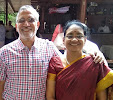My wife and I need to meet our cousin who lives about 25 kms away. There are multiple routes to reach her place, and before we leave, we discuss the options. I feel going through the "ring road" is quicker since the roads are wider, and there are less signals to pass through. However, the route is longer by about 6 kms. The route via the city centre, though shorter, has more signals. Anyway, the options are only regarding which route takes longer. We don't want to be stuck on the road for a long time. No fun in that and with petrol prices at stratospheric levels, we cannot afford that too!
We choose the ring road, the over-riding reason being that I am driving the car. But we didn't contend with the traffic jam today. There are at least three places where the traffic is insane and at each place we spend almost 10 minutes navigating through 6 lanes of vehicles of all description crammed into three lanes of traffic, with motorbikes occupying all intervening spaces. With the stop-start-stop being the norm, my wife also starts the same "start commenting, stop commenting, start commenting". If you had listened to me, if you had driven through the city, if I had not finished dinner before leaving as you wanted me to, if...if...
How can wives know where the traffic will be lighter? Beats me. But during occasions such as these, they pretend they have a seventh sense (the sense to detect traffic jams).
We do tend to look back at various points in our lives to pause and reflect. If only I had prepared for my CAT more thoroughly, if I had applied for a US university, if I had not taken up my job at XYZ, if I had done this, if I had not done that...
In fights with my wife, we have said many things to each other including if we had not married each other. I have often thought of this, honestly..
Life is full of choices. We are confronted with this right from our school days, where our parents make the choices on behalf of us. They choose our schools and from there we form friendships and alliances and networks. These are some of the strongest influences in our lives. We remember many of our school friends even later on in life. Thanks to the internet and social networking sites, we can remain connected even when we are into our fifties. Later on when we move to higher classes, we need to make our own choices. The most important "fork in our life" comes when we move from X std. to junior college or Plus 1 or XI (depending on the board of education). Science, Arts, or commerce? PCMB or PCMC? Commerce with Economics and Statistics or Business studies? The decisions we take here determine the path along which we will travel for the rest of our lives. Oftentimes we consider ourselves too immature to take these decisions and leave them to our parents to decide. The more "mature" ones have even "maturer parents" who want their kids to take a particular course. Entrance exams, colleges, courses, jobs... and the list goes on probably culminating in "choosing" the life partner.
"I think Arup (name changed) should have taken metallurgy in NIT Jaipur instead of studying electrical engineering in a Bangalore college. You (this to her husband) told us then when we went for counselling that Arup need not go to Jaipur. The college is not so good. But now Lalitha's son, Prashanth, has completed B.E. Computer science from NIT Jaipur and has got admission in a US University. If only Arup had joined NIT Jaipur...."
It is comforting to live in the past and examine each decision and choice with the benefit of hindsight (which has 20/20 vision) and then find fault with one's own choice or with the choice of the partners. In my opinion, this is wishful thinking and doesn't take us anywhere. You cannot drive a car constantly looking at your rear view mirror. You only look at it occasionally to see what is behind you. Drive looking ahead.
Leave the "ifs" in the realm of flowcharting where it truly belongs. You need to ask yourself many questions starting with "if" while flowcharting, to understand the various choices people in the process make. What do you do if the invoice doesn't have the PAN number of the supplier? What will you do if there is no budget this year for the item indented, but it is a critical item needed now? Ask innumerable questions with IF at each stage of your process while creating your flowchart for the process that you are studying to determine what actions people take under various situations.
However, do not live your life with an IF.


